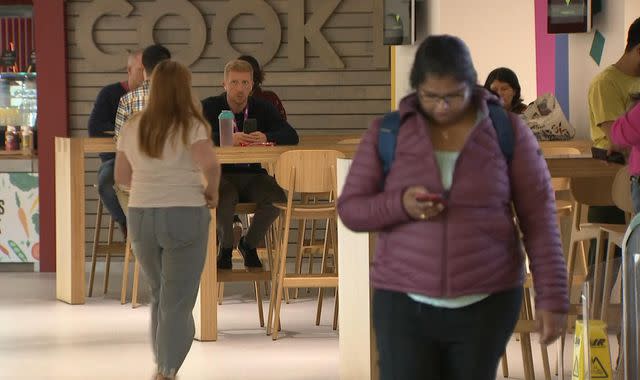More than one in four UK universities operating food banks for students, report finds

More than one in four UK universities are operating food banks for students in response to the cost of living crisis, according to new research.
The report by the Higher Education Policy Institute also found:
• Three-quarters of universities offered discounted food and drinks to students
• Nearly half provided financial assistance with healthcare and free period products
• More than a third helped towards costs of travel and digital equipment for study
The National Union of Students called the findings "a damning indictment" of the government's policy in respect to students and the rising cost of living.
"Students are the nurses, doctors, teachers and public sector workers of the future," said Chloe Field, the NUS vice president for higher education.
"Yet all too many are having their futures blighted by poverty and hardship that risks scuppering their potential."
The University of Manchester is among the higher education institutions that have given direct one-off payments to all students to help cover rising costs. It has also provided food vouchers and hardship grants.
But many of its students are still having to work "up to 50 hours a week" to pay university and household bills.
"We've seen a big rise in the numbers of our students having to work alongside their studies," said Robbie Beale, officer of activities and culture for the University of Manchester's Students' Union.
He said more than half of students now worked alongside their studies, a rise of 10% in two years.
"We found that many of our students are working 20, 30 hours, some even up to 50 hours in a week, which is crazy I know, but there are some students that just have no financial support to fall back on at all," he added.
Mr Beale said this not only "impacts your studies" but also students' ability to "make friends and form the kind of connections that university is all about".
Maintenance loans have not risen in line with inflation
The university said it has also seen a rise in the number of students choosing to live at home with family and commute to classes.
Maintenance loans, provided by the government and repaid by the student after their studies, have not risen in line with the rate of inflation over several years. These loans are intended to help pay for student living costs.
Mr Beale said this has had a "big impact" on students, especially those who are living in private sector accommodation where rental prices have risen over the past 18 months.
One fourth-year student said she's seen student rent "increase significantly".
"The price of housing now is the same as how it was before but without bills, whereas previously it included all bills," she said.
"And that's really challenging."
Food prices 'just keep going up'
Adam, a second-year student, said "food prices" were his biggest issue.
"They just keep going up," he said. "I have to get a job to pay my bills and pay my rent because I don't get enough from my loan."
In response to Wednesday's report, the Department for Education said it was "encouraging to see that many universities are doing a good job to support students who are struggling financially".
A spokesperson said £276m had been "made available this academic year, which institutions can use to top up their own hardship schemes".
But Dr Simon Merryweather, the University of Manchester's director for student experience, said it is important to look at whether it is the "place of universities" to fill this gap in student finance caused by "the cost of living or governmental policy changes on things like maintenance loans and NHS bursaries".
He added: "Through the strength of its response, has the sector inadvertently absorbed some of the impact to the extent that the imperative for government to act is lessened?"

 Yahoo News
Yahoo News 
